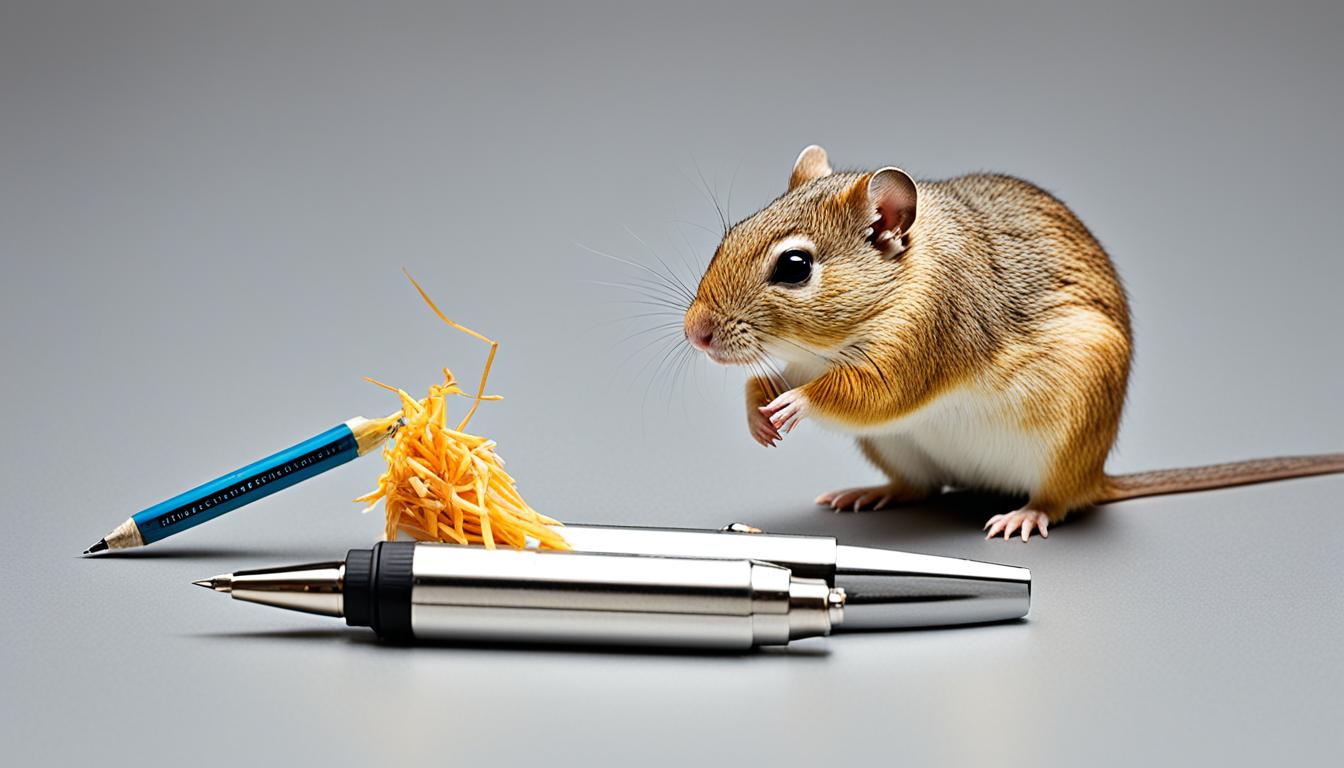To tame your gerbil, start by creating a secure, comfortable environment where it can explore without stress. Gradually build trust by offering treats and spending gentle time near its cage. Use slow movements and positive reinforcement to handle and groom your gerbil, supporting it with your hands and avoiding sudden actions. Consistency and patience are key; if you keep working on bonding techniques, you’ll discover more ways to gently and confidently handle your pet.
Key Takeaways
- Create a secure, comfortable habitat and spend time nearby to help your gerbil acclimate and reduce stress.
- Use treats and positive reinforcement to build trust and encourage gentle interactions.
- Approach gradually, supporting the gerbil’s chest and hindquarters with slow, steady movements.
- Incorporate regular grooming with soft brushes to increase comfort and familiarity during handling.
- Interact daily with patience and consistency to strengthen your bond and foster confidence.

Handling and bonding with your gerbil is vital for building trust and ensuring a positive relationship. When you take the time to gently interact with your gerbil, you create a foundation of safety and familiarity. Before you start handling, it’s important to set up a comfortable and safe environment. A well-designed gerbil habitat setup encourages exploration and reduces stress. Make sure your cage has plenty of hiding spots, soft bedding, and accessible food and water. This makes your gerbil feel secure, which is essential when you begin handling.
Start by spending time near your gerbil’s habitat, allowing it to get used to your presence. Talk softly and move slowly to avoid startling your pet. Once it seems comfortable, gently introduce your hand into the cage, letting your gerbil come to you rather than forcing it. This initial step helps build trust. When your gerbil approaches, offer a treat, such as a small piece of fruit or a seed, to create positive associations with your presence. Over time, your gerbil will associate handling with rewards, making future interactions easier. Additionally, observing your gerbil’s body language can help you understand its comfort level and readiness for handling.
Gerbil grooming is another important aspect of handling. While they groom themselves, you can assist by gently brushing their fur with a soft brush or cloth. This not only keeps their coat clean but also helps your gerbil get used to being touched. Be cautious and gentle to avoid causing stress. Regular grooming sessions, combined with positive reinforcement, help your gerbil associate handling with comfort. Maintaining a consistent routine can improve your gerbil’s trust and comfort during interactions. Incorporating gentle handling techniques can further reduce stress and build confidence.
When it’s time to pick up your gerbil, do so carefully. Place one hand under its body, supporting its chest, while the other gently cradles its hindquarters. Keep your movements slow and steady to prevent startling it. Always handle your gerbil over a soft surface or inside a secure container to prevent falls, which can be frightening or injurious. Remember, patience is key; some gerbils may take longer to get comfortable than others. Incorporating gentle techniques can help ease this process further. Consistent, gentle handling helps your gerbil see you as a trusted companion. Spend a few minutes each day interacting, and gradually increase the duration as your pet becomes more confident. Over time, your gerbil will look forward to these bonding moments, making grooming, handling, and general care much easier. Building this trust guarantees your gerbil feels safe and loved, laying the groundwork for a long and happy companionship. Developing a routine that includes positive reinforcement can significantly enhance your bond and make handling easier.
To further improve your bonding experience, consider yoga techniques such as mindful breathing and gentle movement, which can promote calmness and patience during interactions with your gerbil.
Frequently Asked Questions
How Often Should I Clean My Gerbil’s Cage?
You should clean your gerbil’s cage regularly to keep it healthy. Aim for a cage cleaning frequency of once a week, which helps prevent odors and maintain a clean environment. During each cleaning, change the bedding according to your bedding change schedule, replacing soiled bedding with fresh material. This routine keeps your gerbil comfortable, reduces health risks, and guarantees your pet stays happy and active.
What Toys Are Best for Gerbil Enrichment?
You should choose toys that keep your gerbil engaged and active. Interactive tunnels are perfect because they encourage exploration and play, helping prevent boredom. Chew toys are essential for maintaining healthy teeth and also provide mental stimulation. Look for a variety of textures and sizes to keep your gerbil interested. Regularly rotate toys to keep your pet entertained and guarantee a happy, healthy life.
Can Gerbils Live Alone or Do They Need a Companion?
Imagine a tiny adventurer exploring alone in a vast desert—can your gerbil thrive solo? While some believe solitary gerbil care is possible, most experts recommend gerbil companionship to prevent loneliness and stress. Gerbils are naturally social creatures, and keeping them alone might lead to behavioral issues. Offering a friend ensures your pet’s happiness, health, and well-being, making their tiny world a lively, engaging place.
What Should I Do if My Gerbil Bites?
If your gerbil bites, stay calm and avoid sudden movements. Handling bites can happen if your gerbil feels threatened or scared, so give it time to trust you. Gently clean the bite with soap and water, and monitor for infection. To prevent future biting, handle your gerbil regularly, be patient, and let it set the pace. Building trust takes time, so stay gentle and consistent.
How Can I Tell if My Gerbil Is Stressed or Sick?
You can tell if your gerbil is stressed or sick by observing its body language and signs of illness. Look for signs like lethargy, loss of appetite, or a hunched posture. Pay attention to excessive scratching or grooming, which can indicate discomfort. If your gerbil’s eyes are cloudy or it’s breathing rapidly, these are signs of illness. Monitoring these clues helps you catch issues early and get your gerbil proper care.
Conclusion
Think of bonding with your gerbil as tending a tiny, delicate garden. With patience and gentle care, you nurture trust and friendship, watching it flourish day by day. Each interaction is like watering a sprout, helping your bond grow stronger. Before you know it, your little companion will be thriving in your care, a happy, trusting friend. Remember, patience and kindness are your best tools—soon, your gerbil will be a cherished part of your life.









